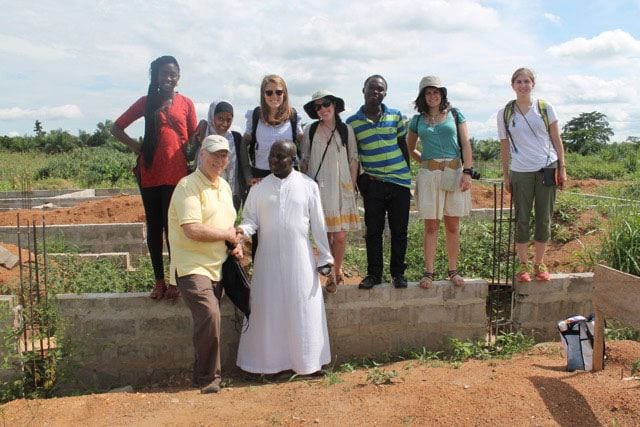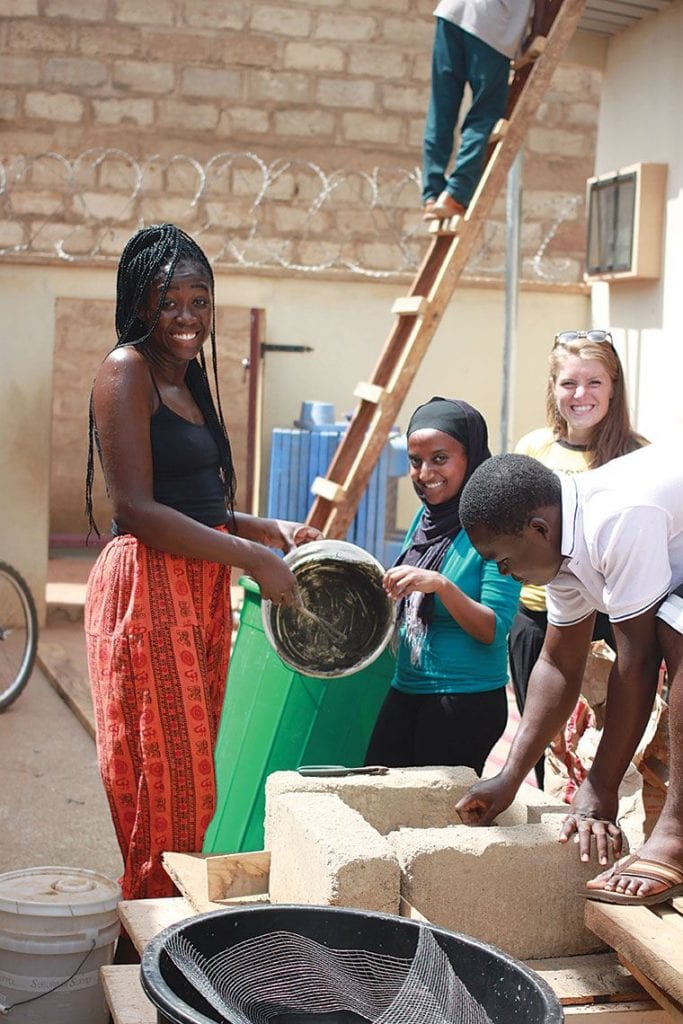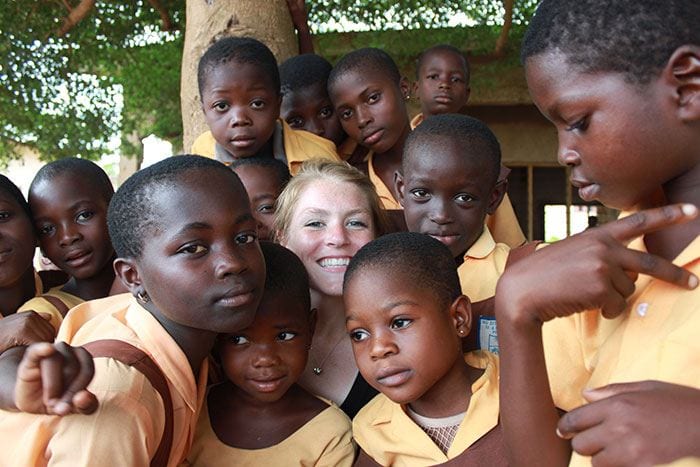Science and service combine in unforgettable student trip to Ghana
By Vicki-Ann Downing
Anna Hayes ’16 (Rye, N.H.), a marketing major and ROTC cadet, served as the photographer on a summer trip that took her 5,000 miles from Providence College. She worked with a professor and five students to implement research projects and document the results in Pokuase Village outside Accra, the capital of Ghana.
Dr. Stephen J. Mecca ’64 & ’66G, professor of physics, is executive director of the Global Sustainable Aid Project, founded in 2007 by his granddaughter, Hannah Davis. The nonprofit works on a variety of projects, ranging from sanitation to education and technology, to improve the lives of people in the West African nation.
Most of those projects are developed and tested by students in Mecca’s lab on the first floor of Albertus Magnus Hall. They call it S-Lab — for science, service, sanitation, sustainability, solutions, study, and systems — all terms that factor in its work.
Each year, Mecca travels to Ghana to implement new projects and to check on the progress of others. Students from PC and other colleges have accompanied him in the past, including Cornell University, The Cooper Union, and the University of Florida. Once in Ghana, they are joined by students from the University of Ghana and Ashesi University.
The six students who joined Mecca for a 25-day visit in 2014 represented the largest contingent ever from PC. They earned course credit for their participation, and three of them received study abroad scholarships to make the trip affordable through PC’s agreement with Santander, N.A.
Asha Ahmed ’16 (Jamaica Plain, Mass.), who is majoring in global studies along with health policy and management, called the visit “amazing.”
“We saw the problems first-hand,” said Ahmed. “We looked at issues from all different angles, hands on, not just sitting and talking. I never saw before how lack of toilets and lack of hand washing could cause a major public health issue. I learned that issues that looked very small can turn into something very big.”

In 2011, the Bill and Melinda Gates Foundation awarded Mecca and the foundation $100,000 for the Microflush-Biofil toilet he developed with students in his lab and an engineer in Ghana. The toilet is simple and affordable to construct and requires no electricity. When users wash their hands with harvested rainwater, the toilet flushes. The waste eventually becomes compost.
Mecca said it’s hard for Americans to imagine that even in its major cities, Africa lacks adequate toilet facilities. People endure the indignity, and the health impact, of using open pits, dirt lots, and rivers. Running water is scarce in rural areas. Waterborne illnesses are common, and diarrhea kills.
“It’s not like any Western city at all,” said Mecca. “That’s the challenge we have in engineering — to meet basic human needs and human rights with scant resources.”
Mecca’s organization, working through partners including Rotary International, has trained people to build the toilets in 11 countries. There’s even a working model at the Jamestown Community Farm in Jamestown, R.I. During the trip to Ghana, Mecca trained the first Microflush-Biofil toilet maker in Liberia — PC student Jermoh Kamara ’15 (Worcester, Mass).
Mecca invites students to observe the training sessions he conducts for local entrepreneurs. Kamara, a public and community service studies major who is minoring in community health, seemed especially interested.
“Jermoh was so intent,” Mecca said. “She was paying close attention. Two-thirds of the way through, I said, ‘I notice you’re super interested.’ She said, ‘Dr. Mecca, this is going to change sanitation in my country. I want to learn this.’”
From Ghana, Kamara visited relatives in Liberia. Using plans provided by Mecca, she hired a mason and an engineer and succeeded in building Liberia’s first Microflush-Biofil toilet on a lot owned by her father on the outskirts of Monrovia. She supervised the work daily to be sure the parts fit together correctly and the roof and walls were finished.
“All Dr. Mecca’s projects are so unique,” said Kamara. “The micro-flush valve that he created for the toilet makes you use less water. You could hear how excited he was talking about it. If you’re not excited, it’s hard to motivate people. He was so excited, it pumped me up, too.”
Mecca has turned his attention to the need to encourage hand washing with soap, focusing on students in schools, where an estimated 40 percent of intestinal diseases are transmitted. Last year in his lab, 10 seniors in a capstone course, Systems Approach to Problem Solving, designed a WASH (water, sanitation, and hygiene) system using recycled soap shavings made into bars of soap and hand-washing liquid.
Two psychology majors, Victor Neirinckx ’14 and Cristina Taylor ’14, then worked in the S-Lab to develop a program to motivate children to wash their hands by incorporating the reward of kicking a soccer ball. Their research was among the featured projects in PC’s annual Celebration of Scholarship and Creativity.
In Ghana, the PC students helped to create a demonstration video using local school children as actors.
“If it works it will be amazing,” said Mecca. “No one has ever been able to build an enduring and effective hand-washing program for the schools.
“Millions of dollars have been spent. On Global Hand Washing Day, you see pictures of children with water streaming over their hands and faces, and two days later, when the water is all gone, the hand washing stops. We looked at what has worked and what the culture is and what the emotions are, and came up with a strategy we’re now rolling out in Ghana.”
Mecca and S-Lab students also developed the IT “Lab in a Box,” a solar-powered, tablet-based computer lab that includes a file server dubbed Raspberry Pi. The unit fits in a person’s hand. The server is pre-loaded with thousands of resources, including books and Wikipedia for Schools, for use even in schools that lack electricity.
More than 100 schools and several universities in Ghana also have benefited from the foundation’s efforts to collect donated textbooks and computers.
Mecca brought the PC students to visit Rev. Bobby Benson ’97G, who earned a graduate degree in theology from PC and runs Matthew 25 House in Koforidua, serving AIDS patients, those who are HIV positive, and children orphaned because of AIDS.
When the students return to the United States, Mecca has them write reflective essays about the trip.
“It’s gratifying to see how they’ve been changed by the experience,” he said.
Ghana is not like home. Students described roads of red clay with goats galloping beside automobiles. They walked to an outdoor market to buy food and ate communally, with their hands. They did laundry in a bucket filled with water. A massive rainstorm that flooded the streets soaked a backpack and ruined a computer.
They learned that women often aren’t educated because of the cost to families.
“Through a camera lens I can see all the potential and beauty of Ghana,” Hayes wrote in her blog. “I see a castle, a tourist destination, a beautiful market place, wonderful people, and rich vegetation. I also see trash, poverty, people sleeping on benches. One picture shows Ghana in all its splendor, another shows all the pain.”
When she returned home, she read and was deeply affected by Homegoing, a work of historical fiction by Yaa Gyasi. Set in Ghana, it features the castle she referenced — Cape Coast Castle, where slaves were held in dungeons.
The PC students who went to Ghana represented a variety of majors. Amy Luke ’15 (Delmar, N.Y.), a philosophy major, went to photograph the trip for Mecca and spent time visiting schools to see how they were using their libraries of donated books.
Luke said Mecca is “very passionate about his work. He is very focused on the jobs that need to get done. He’s a very good conversationalist. He’s had a lot of different life experiences that he can relate to different situations. We learned a lot.”
Brittany Mandeville ’16 (North Scituate, R.I.), who is double majoring in biology and health policy and management, was surprised when she unpacked a box of microscopes in Ghana and realized she had packed them six months before while working in the PC biology lab, unaware of their destination.
“It was a wonderful surprise,” said Mandeville. “I then taught the science professor there how to use them and designed some simple experiments to get them started.”
Mandeville is continuing to develop more ideas for science experiments in the PC lab.
Mary Murphy Walsh ’16 (Newport, R.I.), a social work major, trained teachers how to run libraries, worked on the hand-washing video, and helped train local entrepreneurs in the building of toilets. She said she was proud to discover that Mecca’s systems are “completely sustainable,” based on the evaluation methods she learned in a PC course called Social Systems.
“For some reason it did not hit me until I was actually in Ghana that the problems we were going there to help work on would actually affect me while I was there,” said Murphy Walsh. She couldn’t carry her own water bottle — there wasn’t enough water. She worried about finding a useable toilet. But most of all, she was won over by the sense of community.
“I wonder if I did enough, if I was effective. Sometimes I think that I did not effect as much change in Ghana as Ghana has effected in me,” Murphy Walsh said.
“Giving back is hard,” Hayes wrote. “It takes time, money, and a little bit of your heart. Sometimes it involves not having running water and making yourself a little uncomfortable. Sometimes, it feels ineffective and pointless when there are so many problems in the world as you confront your own insignificance.
“Do it anyway. When you give back a little, you become connected to other human beings in a world where we are connected in all the wrong ways. … I do not do my part enough. I wish it was easier to give.”







